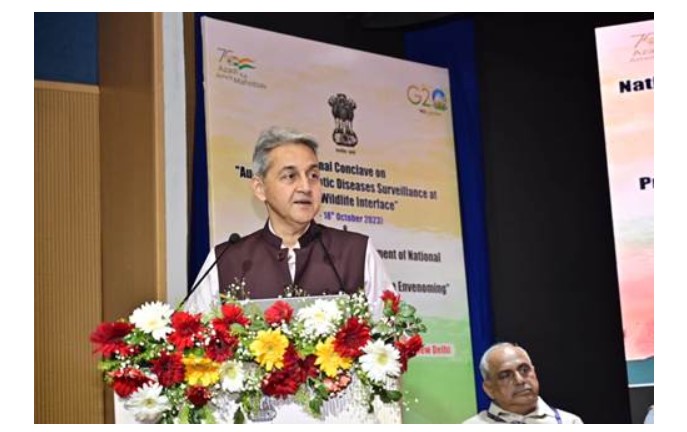Union Health Secretary, delivers the keynote lecture at the National Conclave
"Zoonotic disease is one of the major concerns that affects both human and animal health." Over the previous three decades, 75% of newly developing infectious illnesses that have afflicted people have been zoonotic in nature. Because of a lack of information and skill in identifying zoonotic diseases, as well as insufficient diagnostic capabilities at all levels, infectious diseases caused by zoonotic pathogens have been neglected." This was stated by Union Health Secretary Shri Sudhansh Pant while delivering the keynote address at the National Conclave on "Augmented Zoonotic Diseases Surveillance at Human-Wildlife Interface" and National Conclave for Endorsement of "National Action Plan for Prevention and Control of Snakebite Envenoming" to Stakeholders, organised by Centre for One Health, National Centre for Disease Control (NCDC) here today. He was also joined by Atul Goel, Director General of Health Services; R Jaya, Addl. Secretary, Ministry of Tribal Affairs; Ashok Kumar, Asst. DG (Animal Health), Indian Council of Agricultural Research (ICAR); Abhijit Mitra, Commissioner Animal Husbandry, Ministry of Fisheries, Animal Husbandry and Dairying, Payden, Deputy WHO Representative to India; Simmi Tiwari, Joint Director and Head-COH, NCDC and Ajit Shewale, Deputy Director, COH NCDC.
The Union Health Secretary stated that, in addition to the growth of zoonotic illnesses, Anti-Microbial Resistance (AMR) has emerged as a key global issue. He went on to say that "the rapid spread of multi‐drug resistant bacteria and lack of new antibiotics to treat infections caused by newer & more potent antimicrobial agents like Carbapenems pose a rapidly increasing threat to human health which urgently needs to be addressed." "Similarly, food borne diseases which can be caused by poor hygiene, availability of antimicrobials, environmental contamination, and animal husbandry malpractices on farms, such as misuse of antibiotics also constitute a significant threat" , he went on to say.
In view of these new and rising health dangers, the Union Health Secretary emphasised the necessity of the 'One Health' approach, which was reaffirmed by India's G20 Presidency theme of 'One Earth, One Family, One Future' by the Hon'ble Prime Minister, Narendra Modi.
He highlighted the various "One Health" efforts undertaken by the Government of India, stating that the NCDC, through its various technical divisions, IDSP, AMR, Climate Change, and Centre for One Health, has been entrusted with activities pertaining to pandemic preparedness likely to emerge from zoonotic threats at the human, animal, and environment interface. "Through NCDC, the Union Health Ministry is already implementing various national programmes such as National One Health Programmes for Prevention and Control of Zoonoses (NOHPPCZ), National Rabies Control Programmes (NRCP), Programme for Prevention and Control of Leptospirosis (PPCL), Snake Bite Prevention and Control (SBPC), National Programme on AMR Containment, and National Programme on Climate Change and Human Health (NPCHH)." In the case of zoonosis, the ICMR and ICAR have formed a partnership to define collaborative research goals.The Ministry of Science and Technology has proposed a One Health roadmap for India in collaboration with the Ministries of Health, Agriculture and Environment, Forest and Climate Change, and the FSSAI has taken several initiatives under the Swasth Bharat initiative to raise community awareness about people's eating habits. The NDMA and the Ministry of Health are collaborating on the development and execution of action plans for climate change-related incidents. "India is also establishing a One Health Centre of Excellence in Nagpur under the ICMR to focus on One Health Research," he added.
During the ceremony, dignitaries endorsed the Inter-Ministerial One Health Support Statement on the "National Action Plan for Snakebite Envenoming Prevention and Control." On the occasion, technical documents on the Rabies Helpline, Medically Important Snakes in India, and Zoonotic Disease Prevention, Preparedness, and Response were also released.
Atul Goel emphasised the importance of the 'One Health' approach by emphasising that it includes not just animals but also plants. He emphasised that the spread of zoonotic illnesses is caused by increasing human encroachment on nature.
Under the 'One Health' approach, Ashok Kumar emphasised the importance of early disease diagnosis so that spillover effects from animals to humans or vice versa can be properly addressed. He emphasised that ICAR is working on research and development with several institutions at the inter-ministerial level.
According to R Jaya, the 'One Health' approach flows naturally from Vasudhaiva Kutumbakam's philosophy. She emphasised the need of community mobilisation and raising awareness as vital contributions that the Ministry of Tribal Affairs will make in support of the 'One Health' framework.


